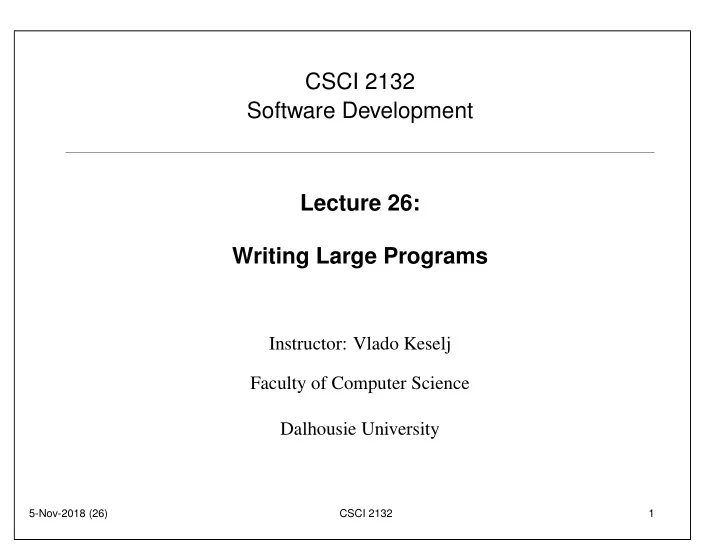

CSCI 2132 Software Development Lecture 26: Writing Large Programs Instructor: Vlado Keselj Faculty of Computer Science Dalhousie University 5-Nov-2018 (26) CSCI 2132 1
Previous Lecture • A common mistake with VLA declarations • More string reading examples • Buffer overflow risks • String library functions 5-Nov-2018 (26) CSCI 2132 2
Command-Line Arguments • To access the command-line arguments, we use another way to define the main function: int main(int argc, char* argv[]) { ... } • argc is the number of command-line arguments • argv is the array of command-line arguments; it is an array of pointers to char • argv[0] is the program name as executed 5-Nov-2018 (26) CSCI 2132 3
Example: sortwords program • Example: sortwords program, which sorts words given in the command line • Usage example: ./sortwords orange apple banana • It should produce: apple banana orange 5-Nov-2018 (26) CSCI 2132 4
Example with argc and argv • In the example: ./sortwords orange apple banana • argc would be 4, and argv could be represented as follows argv argv[0] -------> ./sortwords\0 argv[1] -------> orange\0 argv[2] -------> apple\0 argv[3] -------> banana\0 argv[4] stores a NULL pointer • Code (insertion sort): ˜prof2132/public/sortwords.c 5-Nov-2018 (26) CSCI 2132 5
Writing Large Programs • A large program consists of many modules • Different programmers may work on different modules • Logical to use one or more files for each module – Facilitates collaboration and reusing code • Reading: C textbook: Chapter 15 5-Nov-2018 (26) CSCI 2132 6
Header Files • Files that allow different source files ( *.c ) to share – Function prototypes – Type definitions – Macro definitions – etc. • Naming convention: *.h 5-Nov-2018 (26) CSCI 2132 7
The #include Directive • Tells the preprocessor to open a specified file and inserts its content into the current file • Form 1: #include <file_name> – Search the directories in which system header files reside – On bluenose: /usr/include , . . . • Form 2: #include "file_name" – First search the current directory, if not found then – directories in which system header files reside • Question: Which form for your own header files? 5-Nov-2018 (26) CSCI 2132 8
Recommend
More recommend